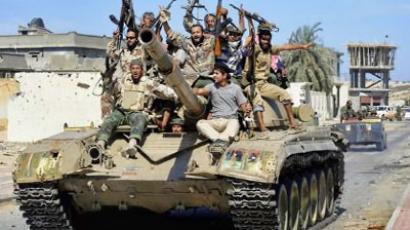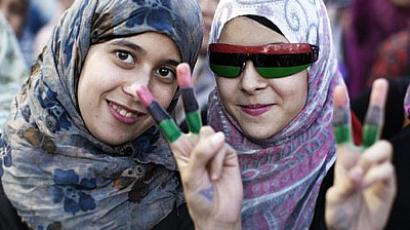Recovery postponed as euphoria grips Libya
Ignoring routine water shortages and incipient tribal conflict, thousands from Libya’s new ruling class are devoting their energies to rejoicing instead of attending to the pressing task of rebuilding their devastated country.
Meanwhile, Libya's interim rulers have announced that the body of Colonel Gaddafi has been buried. The former Libyan leader’s remains were taken to a secret location in the desert in a bid to prevent his grave being turned into a shrine by his supporters.Gaddafi was buried at dawn with only four witnesses swearing on a Koran never to reveal the location of his grave. The burial was not carried out in accordance with Islamic rituals or Gaddafi’s own last will. His body was put on display in a shopping center’s refrigerator for several days after he was murdered. Thousands came to take a look and have their photos taken with his corpse. Visitors had to wear masks because despite being refrigerated, the body started to decompose.The secrecy and mystery around his death have driven many in Libya and abroad to question whether what was done was right. Many believe he should have been treated as a prisoner of war and given a public trial. In any event, the treatment of the remains of the country’s former leader has in no way adhered to the principles of Sharia law, which the NTC leaders recently said would be the new government’s guiding light.
Freedom euphoria
With cries of liberation still ringing loud and clear through the streets, many fear the lack of an enemy to unite against could quickly reveal the rifts among the new Libyan leadership.“It looks like a state of euphoria, everybody’s happy, even though there is no formal law and order,” says Tripoli student Marwan Jundy.The rejoicing throng seems unaware of the price paid for freedom in Libya.Some 30,000 civilians are said to have been killed and 4,000 are still missing in the civil war and NATO bombings, which saw private houses leveled together with their inhabitants due to targeting mistakes.Tripoli resident Mohamed, whose house was bombed, told RT’s crew: “They apologized to our government, but not to us. Who is going to rebuild my house? Who will compensate us for our loss?”Much of the country’s infrastructure has been destroyed. Finding water is now a serious challenge in the capital, Tripoli, where many have no running supplies and try to collect what they can.“I have a family with six kids. We need water to live and so come here every day and get water. It is very difficult,” a local resident told RT as he collected water from a standpipe.“They bombed the electric station in Ben Walid. It’s been 10 days, and they haven’t fixed the problem,” said another resident. Before the war, Libya could boast one of the best living standards on the continent, with high life expectancy and low child mortality rates. After months of heavy bombing and fierce fighting, the country’s economic and social achievements have been brutally reversed. Libyan people are now betting on a heavily-armed but inexperienced group to govern them through a fresh start in the wake of the destruction.Local resident Ali asked RT to not reveal his face, fearing he might pay for expressing his views. “If you talk or say anything positive about Gaddafi, you will have serious problems with the rebels. There is no government, and speaking out will be the end of you,” Ali revealed.He believes that if people were truly happy about the end of Gaddafi and the way he was killed, there would be millions, not thousands, out on the streets.“I’m sure some 60 to 70 per cent of the country do not approve of the way Gaddafi was killed. We expected him to be tried as a prisoner of war, not killed like that. And we are told in the new Libya there will be justice. He was the head of this country and there was no justice in the way he was killed. I have no hope for the future,” Ali concludes.Asked whether he thinks more time is needed to effect change in the country, Ali replied: “I think there will be a lot of fighting in the future. Right now in Jamal and Zwara there is fighting going on between tribes, and anyone with a weapon has power and can do what they want.”So while armed people in military fatigues are celebrating this new era in Libya’s history, ordinary civilians like Ali are keeping their fears to themselves and quietly bracing for the worst.














